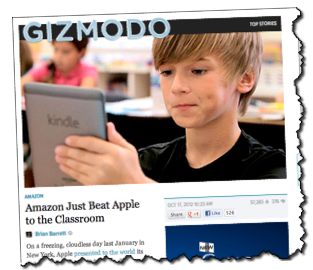Whoops. It suddenly occurred to me: the old Mac-Windows rivalry is dead. There goes a bit of industry history.

It used to be fun, back in the old days, when it mattered. If you’re old enough you’ll remember the famous 1984 Macintosh ad. I was generally forgiven by the Mac zealots for my weakness for Windows, but only because I also used Macs and recognized their superiority. My Mac friends treated my sympathy for Windows systems as a forgivable flaw in my character.
I used to tell this modified version of an old joke:
Somebody dies and goes to heaven. On arrival, St. Peter gives him the quick tour of the place. As they go through heaven from place to place, they look at the mall, the school, the park … and they keep seeing a high wall on one side or the other. Finally, the new arrival can’t resist asking: “What’s with the wall?” St. Peter Answers: “That’s where we keep the Mac users. They like to think they’re the only ones here.”
I like Apple. I consulted with Apple from 1982 to 1994. Apple loaned me an Apple II in 1983 and a Macintosh early in 1984. I wrote the first book laid out on an AppleLaserWriter (at least according to me and McGraw-Hill Microtext, the publisher). As a consultant to Apple, I worried as Windows started to effectively imitate the Mac — not that it was as good, but it was good enough to fool a buyer in a store. And it was personally painful to me when the Windows system so dominated business computing, the late 1990s and early 2000s, that we (temporarily) dropped our Mac business plan product. We really had to. By 2000 a Mac product was costing ten times more than Windows to develop, and its market was about ten times less than Windows. Business is business.
By 2004 my computing was all Windows. And at that point my computing was all Windows. It wasn’t torture. Windows worked. I use a computer to get things done, and Windows did. I may have still preferred Mac, but hey, business is business.
And then the Mac came back. We saw them first in airports, the MacBooks, silently gaining strength and visibility. Then there was the iPhone, and more MacBooks. And then the gorgeous new iMacs. I taught an entrepreneurship class at the University of Oregon from 1998 through 2009. In the beginning all my students had Windows laptops. By the end, 80% of them were on Macs.
Once again, being Mac literate is good business. At Palo Alto Software, our LivePlan SaaS app is browser-based, operating system neutral, and developed mostly on Macs. And Mac software, and the Mac software market, are growth markets again. The app store works. Happy ending.
So now I’m almost all Mac again. I have two iMacs at home, a MacBook air, and iPhone and iPad, and I love it. An old friend. Isn’t computing great? And my Windows 7 desktop, in the office at the company, still works just fine too, thanks. It’s not good and evil, just computing.
But don’t tell the Linux geeks.

 Ah yes, the good old days. How quickly time passes. And I can’t help occasionally browsing through technology looking back. My youngest daughter is in her late twenties now. She can barely remember life before cellphones, and can’t remember life before personal computers or VCRs, because both of those were born before she was. I was talking a grandkid the other day, and she couldn’t conceive of a world before amazon.com.
Ah yes, the good old days. How quickly time passes. And I can’t help occasionally browsing through technology looking back. My youngest daughter is in her late twenties now. She can barely remember life before cellphones, and can’t remember life before personal computers or VCRs, because both of those were born before she was. I was talking a grandkid the other day, and she couldn’t conceive of a world before amazon.com. I will tell you that this is definitely me. I’ve done this all my life. I veer off to a new organization system like a dumb fish following a shiny new lure in the water. And I see other people doing it too, all the time, all around me. You don’t need a new spreadsheet, or to-do list software, or project planning system; you need to use what you have regularly.
I will tell you that this is definitely me. I’ve done this all my life. I veer off to a new organization system like a dumb fish following a shiny new lure in the water. And I see other people doing it too, all the time, all around me. You don’t need a new spreadsheet, or to-do list software, or project planning system; you need to use what you have regularly. Have you heard the standard cliche: “Necessity is the Mother of Invention?” In business technology and productivity, in my experience at least, the old standard is reversed: the new truth is that Invention is the Mother of Necessity.”
Have you heard the standard cliche: “Necessity is the Mother of Invention?” In business technology and productivity, in my experience at least, the old standard is reversed: the new truth is that Invention is the Mother of Necessity.”



You must be logged in to post a comment.